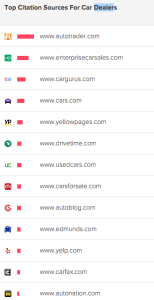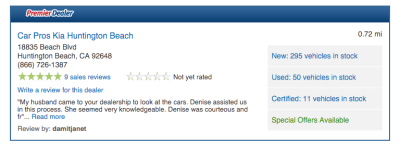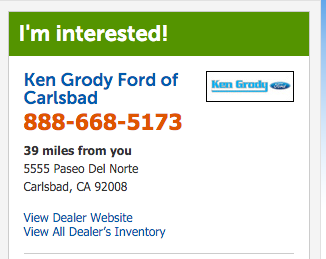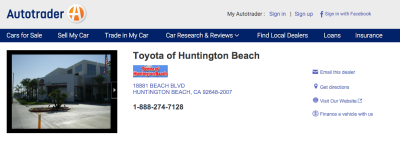Even The Best Citations Can Suck
Recently Darren Shaw and the Whitespark team put out this resource on the best citation sources by category. While the resource is great, I think it falls into some common traps. I don’t want to get to deep into their methodology on how they selected citation sources, other then to say the list is likely sites that Google does consider authoritative in their verticals. More importantly, some of these sources comes with attached strings that can impact a business well beyond SEO.
The Costs & Benefits of Citation Sources
Let’s look at the best citations for car dealers
While these sites appear at face value to be highly relevant to car dealers, their effect may not always be positive. Lots of the sites on this list are lead aggregators. The make money by getting between a car dealer and the customer and then getting paid by the dealer itself. So not only do they comes with a monetary cost that will impact the cost per lead and ROI from that channel, but they mess with NAP data to do it. Most of the sites that are lead generators track their performance (which they are paid for) by using toll-free call tracking numbers. This means that are actually creating NAP issues in exchange for paying them for leads. Here are examples of several of the top ones.
All of this begs the question, what is the value of an incorrect citation at a highly relevant directory? Is it negative or positive? Considering that phone number has long been discussed as the primary way Google matches NAP for a business it seems like there is a strong possibility the effect is negative.
And what about the impact on the business? We have a lot of experience working with car dealers and have been told by clients that because of the massive amount of overhead a dealership requires to operate, It’s very dangerous for dealerships to progressively rely on a third party for customer acquisition. These leads tend to start at a low cost for the dealer, until the third party provider has the leverage to demand a higher rate. If the dealership is not willing to pay, they face losing a massive customer source.
Takeaways
- Be informed and transparent – It’s really important to know what you are recommending to a client. I have long felt that SEO best practices tend to focus on what is best in an SEO vacuum and are not necessarily best for the client. I would make a small bet that local SEO’s are constantly recommending that their clients get on 3rd party niche citations because it’s best for their SEO campaign, but it might not necessarily be the best for the clients business. If you are recommending that a client enters into a deal which may have a cost for their business outside of SEO then not only should you know that, but you should tell your client as well.
- Do no harm – Make sure you aren’t in such a rush to build authoritative, niche citations for your clients that are you are polluting their NAP data. If a citation source requires a call tracking number be used on a profile, then you should immediately be wary.
- Don’t Take Business Advice From Your SEO – Let’s face it, we all like to give advice to clients well beyond the channel we are helping to optimize. While this advice can often be positive, it can also be detrimental. As a client, or someone who is managing a digital business, make sure you are always asking your SEO how a given tactic or strategy might impact other channels or the business overall.
- Do You or Don’t You Get the Citation? – From an SEO perspective, if you have a lot of NAP problems to start with, it might make sense to hold off until you get that under control. However, as a business owner, if you are more concerned with rapid lead generation and are informed about the deal you are entering into, or are a risk taker, then it might make sense to deal with these lead generators. There is no right answer for everyone.



